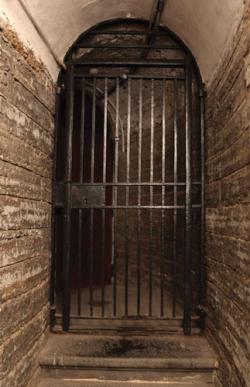 Today I was talking to a woman who goes twice a week to visit her son, Pedro, who is serving 10 years in prison. Listening to her I began to understand how the family suffers. Pedro is in a jail built 100 years ago for a maximum of 1,800 men. Today it holds 7,000 inmates.
Today I was talking to a woman who goes twice a week to visit her son, Pedro, who is serving 10 years in prison. Listening to her I began to understand how the family suffers. Pedro is in a jail built 100 years ago for a maximum of 1,800 men. Today it holds 7,000 inmates.
Pedro’s mother, like many other of the mens' relatives, began queuing at 2:00a.m to get in at 9:00a.m. In the rain, in the cold, they have no shelter. They bring clothes and food as there is never enough food provided in the jail. In spite of visitors being partly strip-searched - a degrading experience - drugs, cell phones and drink find their way inside.
A Repressive System
The system is one of repression and punishment. Up to 30 men at a time sleep in cells that were built for eight. They pool the food and take turns to cook. When they wash their clothes and hang them up over the passage way, they have to keep watch that they are not stolen to be sold for drugs.
Close living conditions with nothing to do, abysmal toilet facilities, various mental and physical complaints create a climate of unrest, fighting, and consuming drugs. Some of the men spend their time taking irons out of the beds, walls and stairs to make weapons like spears to fight each other, which leads to many injuries. In one week 203 were murdered.
In spite of these conditions one is surprised by the depth of faith, hope and solidarity that is to be found there among those who have a change of mind, heart and spirit. Those who recognize they have done wrong, and they are few, want to change their way of thinking and acting; they want a new life. But sadly, for the great majority life in this prison is a brutal affair where many give up all hope of new beginnings.
New Beginnings for Juan
In another jail outside Santiago where there are 5,000 men, we said goodbye to Juan as he left for Bolivia after serving an eight years sentence. Over the last two years he worked in St Columban’s workshop where he learned a lot about copper work at the arts and crafts course. He also took a course in solar panelling. He made one for me and what a treat it is to have boiling water from the sun.
Throughout the last year Juan took four men each month and taught them all he had learned. With patience he even taught some of them to read and write. Juan felt happy to be going; he was one of the lucky ones who had availed of the opportunity to learn something he could work at when he got back to his own people.
The fact that he was able to share his experience with others helped him in some small way to repair some of the damage he had done by working for 18 years in drug factories in different parts of the world. In Bolivia he will begin a new and better life.
Realising what damage has been done
One can never understand the mystery of life where there are some people who do a lot of damage and only fully realize it when they come to jail. As many say to me, “I had to come here to stop doing what I was doing when I was young; the dangers I was in and put others in.” Many see the hand of God in this. It's an opportunity for some to seek help to change, but others continue as they are and refuse any help that is offered.
What would Jesus do
I ask myself, ‘What would Jesus do?’ How would He relate to the Pedros and the Juan's in these prisons? To the innumerable men spaced out by drugs, brutalized by violence, alienated from warm human contact, sunk in despair? Every day I hear Him say, ‘I was in prison and you came…’
Maybe, in the end, that is all He asks of us - to simply be there for others.
 Columban Sr Angela McKeever has served in Chile for almost 30 years.
Columban Sr Angela McKeever has served in Chile for almost 30 years.